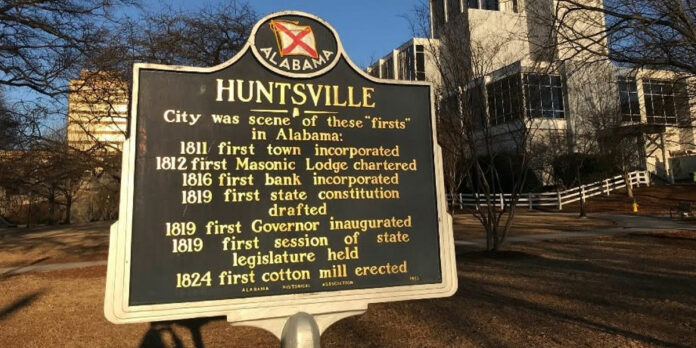Huntsville has a long history, going back well over 200 years. Most Huntsvillians know that John Hunt, the first settler of the Big Spring area, is the city’s namesake. However, not everyone knows that Huntsville had a different name once upon a time.
Prior to November 25, 1811, Huntsville’s official name was Twickenham. The town’s first man of influence, LeRoy Pope, had named the town Twickenham in honor of his favorite English poet’s hometown. But the fancy pants English name didn’t stick long. To begin with, many residents never quit calling the settlement by its original de facto name – “Hunt’s Spring.” But much of why Huntsville legally became “Huntsville” has to do with our disdain of Great Britain at the time.
Some of the Hunt’s Spring settlers had fought in the Revolutionary War against the Redcoats, and most had a father, uncle or older brother who did so. The wounds from that war still hadn’t fully healed. To make matters worse, the tension boiled over into the early 1800s due to trade restrictions imposed by the British, which was the root cause of the War of 1812. So in 1811, most hardscrabble Alabama frontiersmen weren’t too keen on having their town named in honor of some tea-sipping British poet.
The first part of the name “Huntsville” is obvious. John Hunt was the first settler of the town (or at least the first to stay awhile, James Ditto was technically the “first”) and locals thought he deserved the honor of having his settlement bear his name. But why “ville?” Why not Huntsburg, Huntsford, Huntsboro, or Huntington?
The answer goes back to our tension with the British, but also our admiration for the French, whose word for “town” was “ville.” You have to recall that the French saved our butts in the Revolutionary War. In fact, American colonists probably would have lost the Revolutionary War if it hadn’t been for French military intervention.
For this reason, you can often deduce the age of a city’s name in the Deep South by the end of its name. Cities like Birmingham, Anniston and Sheffield, all with very British-sounding names, weren’t established until the 1870s-80s when America was once again on good footing with the Brits. But if a city’s name has a “ville” at the end, i.e. Huntsville, Nashville, Knoxville, Fayetteville (NC & AR), Jacksonville (AL & FL), Louisville, Guntersville, Russellville, and Woodville, it’s highly likely the town got its name after the Revolutionary War but prior to the 1850s. There are exceptions to this rule (see Rainsville), but it generally holds true.
In fact, many of these ‘villes changed their names during this period just as Huntsville did to get rid of British culture. In perhaps America’s first episode of “cancel culture,” Southerners led the way: Nashborough became Nashville, TN, Campbellton became Fayetteville, NC, Cowford became Jacksonville, FL, and Twickenham became Huntsville, AL.
So there you have it — Vive la Ville of John Hunt!
![]()
Don’t miss out! Subscribe to our email newsletter to have all our smart stories delivered to your inbox.



